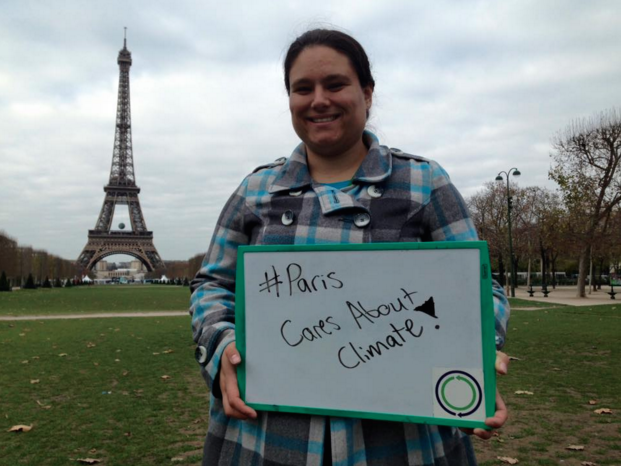The past week has felt like the longest waiting game that has ever been played. As high-level ministers talked behind closed doors, we diligently worked to influence the process however we could, from social media, to press conferences, to direct discussions with negotiating staff about the agreement. We even participated in a few actions within the conference space to let negotiators and the world know what we wanted in the agreement. Finally, on Saturday, representatives from 196 countries came together in the plenary halls to declare that they had come to an agreement.
This is a historic moment. This is the first time that the global community has come together to create a process to address global climate disruption that does not just fall on developed nations (although they must do more because they are historically more responsible for emission production), but falls upon everyone everywhere to act on climate, and that is an exciting prospect. All nations agreed that they need to keep global warming on average well below 2℃, in fact they want to aim for 1.5℃ or below in order to protect low-lying islands and desert regions. This means that, according to science, they will have to phase out fossil fuels and keep current reserves in the ground if they want to stay below those targets. Per the agreement, that should happen by the end of the century at the latest.

They also agreed that they would submit pledges every five years that will be monitored, reported, and verified to make sure that countries are complying with what they said they would do. This will be accompanied with finance and support for projects that help with mitigation and adaptation to climate change, as well as reparations that are associated with the losses and damages to climate change. Finally, for the first time in international environmental law there are references to equity language such as human rights, gender, and intergenerational equity (future generations), indigenous rights, health, migrants, and persons in vulnerable situations, which links this environmental concern directly to individuals that will be impacted. Many of these ideas are innovative, and it is incredible that we have moved so fast and so far in international climate policy in a few short years, and a lot of it had to do with the global movement that we have created.
In the past couple of years the world has demanded that countries take action on climate disruption from the People’s Climate March, to major religions expressing direct requests for action, to local movements that are getting campuses, cities, and churches to divest. The tides are changing, and people are demanding that the threat of climate disruption is addressed immediately in just ways.
Now more than ever it will be important to keep up this momentum and hold our governments accountable to take significant steps to address climate disruption as is outlined in this agreement. We need to go home and push our governments to develop plans to uphold their end of the bargain and to do more than they think they can. This is an exciting time for all of us, and it is amazing what we can accomplish when we decide that we need to address something. It is clear now that this is not the end of our work, but only the beginning to decarbonize our future, create just transitions, and prevent warming in order to protect the most vulnerable among us. This is a matter of protecting lives and livelihoods, so take this moment and build momentum from it for our communities, our countries, and our planet.
